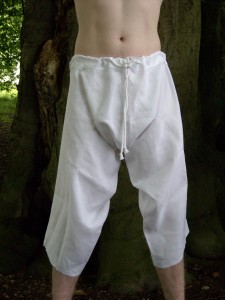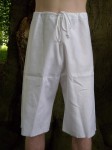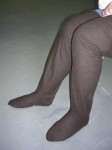 Long Leg (Pipe) Braies |
Braies (or Breeches) were the innermost layer of mens clothing. They fill in the gap between single leg hose in the 13th and 14th centuries. As hose became fuller, braies got smaller.There are no surviving examples of braies as linen rots away too quickly. All these examples are “best guesses” worked out from pictorial evidence.
Long leg braies were worn between single leg hose. “Boxer” braies are an alternative pattern for the same garment, with less fullness in the rear.
15th century braies are worn under joined hose, the Italian braies are seen in paintings from the end of the 15th century.
Braies £35 |
 “Boxer” braies |
 15th Century Braies |
|
 15th Century Italian Braies |
Related Searches: 13th Century, 14th Century, 15th Century, Menswear
 13th/14th Century Single Leg Hose and Braies |
Hose began as simple foot coverings and extended upwards covering more of the leg.
During 13th and much of the 14th century hose were single-legged garments (split hose) with long legged (pipe) braies filling the gap between. Hose fasten directly to the waistband (breech girdle) of the braies. Single leg hose (pair) £75, footed £95 |
 13th/14th Century Single Leg Hose (parti-coloured) |
Related Searches: 13th Century, 14th Century, Menswear
 Hood £45 |
The medieval hood is a garment born out of practicality; cold weather-wear turned fashion item. The liripipe (the point at the back of the head) was extended until it reached outrageous proportions by the end of the 14th Century.During the next century, the hood returned to being just a useful protective garment in bad weather. |
 Hood |
 15thC Ladies Hood £35 |
Ladies wore an open hood over a tightly tied coif or headrail. |
 14th Century Ladies Hood £25 |
Related Searches: 13th Century, 14th Century, 15th Century

Shifts and hose are the foundations of womenswear throughout much of history.
Shifts were linen under-garments very similar to mens shirts, just longer and fuller. In the 13th, 14th and 15th century nothing was worn underneath the shift.
Women’s hose were knee-length socks cut from woven cloth. They were often quite loose and held up by garters just below the knee.
Linen shifts £65
Half-hose in linen or wool £45

Ladies Half-Hose
Related Searches: 13th Century, 14th Century, 15th Century, Hose, Shift, Womenswear











